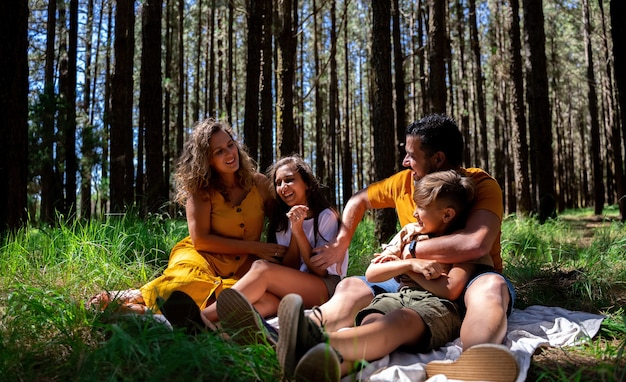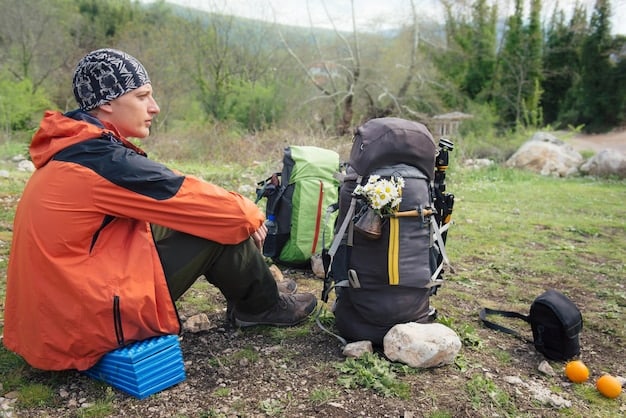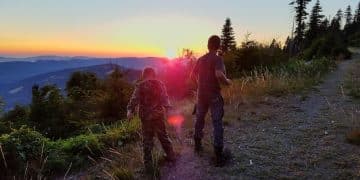Save Up to 40%: Your Ultimate Guide to Budget Camping in the US

Anúncios
Save up to 40% on your next outdoor adventure with our ultimate guide to budget-friendly camping in the US, offering practical tips on finding affordable campsites, utilizing discounts, cooking delicious meals on a budget, and packing efficiently, all while enjoying the beauty of nature without breaking the bank.
Dreaming of hitting the trails but worried about the cost? You can save up to 40% on your next adventure with the ultimate guide to budget-friendly camping in the US. Discover how to experience the great outdoors without emptying your wallet.
Anúncios
Planning Your Trip: Budget-Friendly Camping Essentials
Embarking on a camping trip doesn’t have to be an expensive endeavor. With a bit of planning and resourcefulness, you can significantly reduce your costs and enjoy the great outdoors without breaking the bank. Let’s dive into some essential strategies to help you plan a truly budget-friendly camping trip.
Choosing the Right Location
Location is key when it comes to budget camping. National forests and Bureau of Land Management (BLM) lands often offer free or low-cost camping options compared to private campgrounds. Consider dispersed camping, which is allowed in many national forests, where you can pitch your tent for free. Also, look for state parks, which often have more affordable rates than private options.
Anúncios
Timing is Everything
Avoid peak seasons and holidays when campsites are in high demand and prices surge. Opt for shoulder seasons like spring or fall, when the weather is still pleasant but the crowds are thinner and prices are lower. Weekday camping can also save you money as rates are usually cheaper than weekends.
- Research free camping options on BLM land and national forests.
- Travel during the off-season to avoid high prices and crowded campgrounds.
- Consider weekday camping for lower rates.
Remember to factor in travel costs when choosing your location. Opt for destinations closer to home to minimize gas expenses.
Finding Affordable Campsites
Securing an affordable campsite is a crucial step in budget camping. Luckily, there are plenty of resources and strategies to help you find the perfect spot without overspending. Knowing where and how to look can make all the difference in keeping your camping trip economical.
Utilizing Online Resources
Websites like Recreation.gov, Hipcamp, and Freecampsites.net are your best friends when searching for budget-friendly campsites. Recreation.gov provides access to federal campgrounds, while Hipcamp offers listings for private campsites, often with unique deals. Freecampsites.net is a great resource for finding free dispersed camping locations, ensuring you can enjoy nature without paying a fee.
Leveraging Campground Memberships and Discounts
Consider investing in campground memberships like Passport America or Good Sam Club. These memberships offer significant discounts at participating campgrounds across the US. Additionally, look for discounts for seniors, veterans, and students, which can further reduce your camping costs. Many campgrounds also offer weekly or monthly rates, which are generally more affordable than nightly rates.

- Use Recreation.gov to find federal campgrounds with reasonable rates.
- Explore Hipcamp for unique deals on private campsites.
- Take advantage of campground memberships like Passport America for discounts.
Always read reviews and check for any additional fees before booking a campsite. Some campgrounds may charge extra for amenities like showers or firewood, so factor these costs into your budget.
Packing Smart: Essential Gear on a Budget
Packing efficiently is key to a successful and budget-friendly camping trip. Rather than buying expensive new gear, consider borrowing, renting, or purchasing used items to save money. A well-thought-out packing list can prevent unnecessary expenses and ensure you have everything you need without overspending.
Start by assessing what gear you already own. A tent, sleeping bag, and cooking equipment are essential. If you’re missing items, ask friends or family if you can borrow them. Local gear rental shops often offer affordable rates for tents, sleeping bags, and backpacks. Check online marketplaces like Craigslist or Facebook Marketplace for used camping gear in good condition at discounted prices.

Focus on multi-purpose items, such as a knife that can be used for cooking and repairs. Pack clothing that can be layered to adapt to changing weather conditions, reducing the need for excessive outfits. Consider purchasing a water filter or purification tablets instead of buying bottled water. A well-equipped first aid kit is essential for safety, but you can assemble your own using affordable supplies.
- Borrow or rent camping gear to avoid purchasing new equipment.
- Look for used camping gear on online marketplaces.
- Utilize multi-purpose items to minimize packing and expenses.
Remember to pack light to save on fuel costs and avoid unnecessary baggage fees if traveling by air. A well-organized packing list can help you stick to your budget and ensure a comfortable camping experience.
Cooking on a Budget: Delicious and Affordable Meals
Food costs can quickly add up on a camping trip if you’re not careful. By planning your meals and packing strategically, you can enjoy delicious and affordable meals in the great outdoors. Focus on simple, easy-to-prepare recipes that require minimal ingredients and equipment. Embrace the joy of cooking outdoors and savoring every bite while surrounded by nature.
Meal Planning and Preparation
Before you even leave home, create a detailed meal plan for your camping trip. This will help you avoid impulse purchases and ensure you have all the necessary ingredients. Opt for meals that can be prepared using one-pot cooking methods, such as stews, chili, or pasta dishes. Pre-chop vegetables and marinate meats ahead of time to save time and effort at the campsite.
Affordable Camping Recipes
Consider simple recipes like foil packet meals, which involve wrapping ingredients in aluminum foil and cooking them over the campfire. Oatmeal or granola with dried fruit and nuts makes a quick and easy breakfast. Sandwiches and wraps are perfect for lunch. For dinner, consider campfire chili, pasta primavera, or grilled vegetables with sausages. Bring along spices, seasoning, and condiments to add flavor to your meals.
- Plan your meals in advance to avoid impulse purchases.
- Choose recipes with minimal ingredients and one-pot cooking methods.
- Pack non-perishable snacks like trail mix, granola bars, and dried fruit.
Remember to pack a cooler with ice or ice packs to keep perishable items fresh. Use reusable containers and utensils to minimize waste. Clean up your cooking area after each meal to keep your campsite tidy and organized.
Free and Cheap Activities to Enjoy
Camping offers endless opportunities for fun and adventure, and many of the best activities are free or low-cost. Embrace the simplicity of nature and discover the joys of hiking, wildlife watching, stargazing, and campfire storytelling. Engage in activities that connect you with the natural world and create unforgettable memories without spending a fortune.
Hiking is a fantastic way to explore the surrounding area. Research trails in advance and choose routes that match your fitness level. Bring a map, compass, and plenty of water. Wildlife watching is another rewarding activity. Look for birds, mammals, and other creatures in their natural habitats. Remember to maintain a safe distance and respect their space.
Engaging with Nature
Stargazing is a magical experience, especially in areas with minimal light pollution. Bring a blanket, lie back, and marvel at the night sky. Campfire storytelling is a great way to bond with friends and family. Share stories, sing songs, or play games around the campfire. Consider bringing along a book of ghost stories or campfire songs to add to the fun.
- Go for hikes and explore local trails.
- Practice wildlife watching and birdwatching.
- Enjoy stargazing and campfire storytelling.
Don’t forget to bring along outdoor games like frisbee, volleyball, or cards. These activities provide hours of entertainment and require minimal investment. Remember to leave no trace behind and respect the environment during your outdoor adventures.
Saving Money on Transportation
Transportation costs can significantly impact your camping budget. Consider carpooling with friends or family to share fuel expenses. Public transportation options like buses or trains may be available, especially for campgrounds near urban areas. Choosing a campsite closer to home can also reduce travel costs. With strategic planning, you can minimize transportation expenses and make your camping trip more affordable.
Carpooling and Sharing Rides
Coordinate with friends, family, or fellow campers to carpool to your destination. This not only saves money on gas but also reduces the environmental impact of your trip. Consider using ride-sharing apps to find and connect with other travelers heading in the same direction. Split the costs evenly and enjoy the company of new travel companions.
Alternative Transportation Options
Research public transportation options to your chosen campsite. Buses and trains may offer affordable and convenient routes, especially for campgrounds near urban areas. Consider cycling to nearby attractions or trailheads. This provides a healthy and eco-friendly way to explore the local area. With some creativity and resourcefulness, you can find alternative transportation methods that fit your budget.
- Carpool with friends or family to share fuel expenses.
- Research public transportation options to your chosen campsite.
- Consider cycling to nearby attractions.
Remember to factor in parking fees and toll charges when calculating transportation costs. Pack light to avoid baggage fees if traveling by air or public transportation. A well-planned transportation strategy can significantly reduce your camping expenses and make your trip more affordable.
| Key Point | Brief Description |
|---|---|
| 🏕️ Affordable Campsites | National Forests and BLM lands often offer free or low-cost camping. |
| 🗓️ Off-Season Travel | Travel during the spring or fall for lower prices and fewer crowds. |
| 💰 Online Discounts | Websites like Recreation.gov and Hipcamp offer deals on campsites. |
| 🍲 Budget Cooking | Plan simple, one-pot meals to save on cooking equipment and food costs. |
Frequently Asked Questions
▼
You can find free camping in the US by utilizing resources like Freecampsites.net and exploring Bureau of Land Management (BLM) lands and National Forests. Dispersed camping is often allowed in these areas, providing opportunities for free camping.
▼
Plan your meals in advance and opt for simple, one-pot recipes like stews or chili. Pack non-perishable snacks and consider foil packet meals cooked over the campfire. Pre-chop vegetables at home to save time and effort on the campsite.
▼
Borrow gear from friends or family, rent equipment from local gear shops, or purchase used items from online marketplaces like Craigslist or Facebook Marketplace. Focus on multi-purpose items and pack efficiently to minimize the need for additional gear.
▼
Enjoy hiking on local trails, wildlife watching, and stargazing. Bring outdoor games like frisbee or cards for entertainment. Consider campfire storytelling or singing songs around the campfire for a memorable evening.
▼
Yes, campground memberships like Passport America and Good Sam Club offer significant discounts at participating campgrounds across the US. Look for discounts for seniors, veterans, and students to further reduce your camping costs.
Conclusion
Camping on a budget is entirely achievable with a bit of planning and resourcefulness. By choosing affordable campsites, packing wisely, cooking creatively, and engaging in free activities, you can enjoy the beauty of the outdoors without overspending. Embrace the adventure and create lasting memories on a budget-friendly camping trip.





